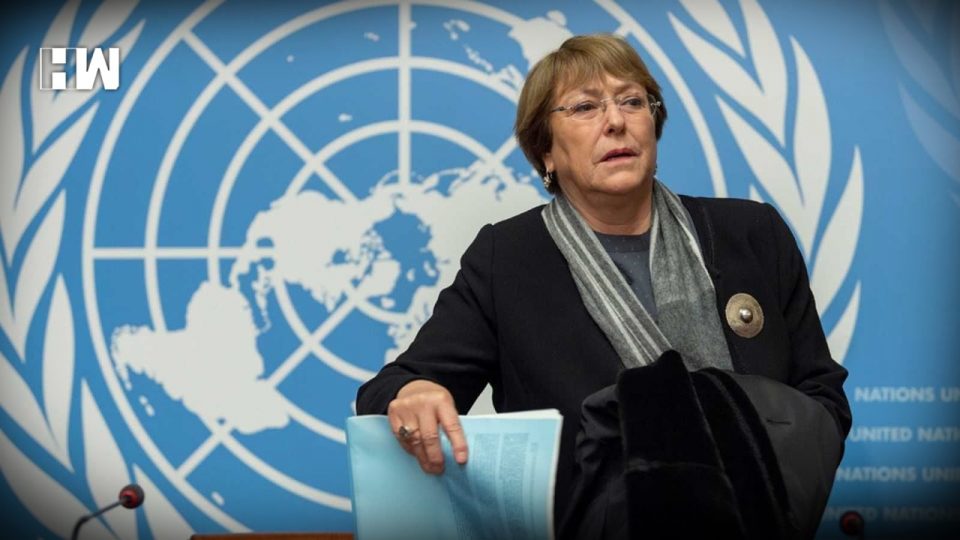Bachelet urged the Indian Government to ensure that “no one else is detained for exercising their rights to freedom of expression and peaceful assembly
Highlighting that India has long had a strong civil society at the forefront of “groundbreaking human rights advocacy within the country and globally”, the UN High Commissioner for Human Rights, raised concerns on Tuesday that “vaguely defined laws are increasingly being used to stifle these voices”.
Michelle Bachelet issued a statement calling on the Government of India to safeguard the rights of human rights defenders and non-governmental organizations (NGOs), expressing regret at legal constraints faced by NGOs, including by the application of laws that her Office (OHCHR) perceives to be problematic.
Foreign Contribution Regulation Act
Ms. Bachelet cited as worrying the use of the Foreign Contribution Regulation Act (FCRA), which a number of UN human rights bodies have also said is vaguely worded and overbroad in its objective. The Act prohibits the receipt of foreign funds “for any activities prejudicial to the public interest.”
Adopted in 2010, and amended last month, the Act has had a “detrimental impact on the right to freedom of association and expression of human rights NGOs”, she added. As a result, it also impacts their ability to serve as effective advocates to protect and promote human rights in India.
According to OHCHR, it is expected that the new amendments will create even more administrative and practical hurdles for such advocacy-based NGOs.
Most recently, Amnesty International was compelled to close its offices in India after its bank accounts were frozen over alleged violation of the FCRA.
‘Constructive criticism should never be criminalized’
“I am concerned that such actions based on the grounds of vaguely defined ‘public interest’ leave this law open to abuse, and that it is indeed actually being used to deter or punish NGOs for human rights reporting and advocacy that the authorities perceive as critical in nature”, Ms. Bachelet continued, stating that even if authorities find “constructive criticism uncomfortable, it should never be criminalized or outlawed in this way.”
Speaking to journalists in Geneva on Tuesday, Rupert Colville, spokesperson for the High Commissioner, noted that “activists and human rights defenders have also come under mounting pressure in recent months, particularly because of their engagement in mass protests against the Citizenship Amendment Act that took place across the country earlier this year”.
More than 1,500 people have reportedly been arrested in relation to the protests, with many charged under the Unlawful Activities Prevention Act, a law which has also been widely criticized for its lack of conformity with international human rights standards.
Freedom of expression, peaceful assembly
Charges have also been filed under this law against a number of individuals in connection with demonstrations that date back to 2018.
Most recently, the 83-year-old Catholic priest Stan Swamy, a long-standing activist engaged in defending the rights of marginalized groups, was charged and reportedly remains in detention, despite his poor health.
Ms. Bachelet urged the Indian Government to ensure that “no one else is detained for exercising their rights to freedom of expression and peaceful assembly – and to do its utmost, in law and policy, to protect India’s robust civil society”.
“I also urge the authorities to carefully review the FCRA for its compliance with international human rights standards and to release people charged under the Unlawful Activities Prevention Act for simply exercising basic human rights that India is obligated to protect”, the UN rights chief added.
Earlier this year, in a welcome development for advocacy-based NGOs, India’s Supreme Court significantly narrowed the definition of what constitutes a “political activity” under the FCRA.
“I encourage India’s national institutions to strengthen the social and legal protections that enable civil society to function freely and contribute to progress”, the High Commissioner continued.
Ms. Bachelet said that OHCHR would continue to closely engage with the Government of India on issues relating to the promotion and protection of human rights, and would also continue to monitor developments that positively and negatively affect civic space, and fundamental rights and freedoms.
As an independent media platform, we do not take advertisements from governments and corporate houses. It is you, our readers, who have supported us on our journey to do honest and unbiased journalism. Please contribute, so that we can continue to do the same in future.

